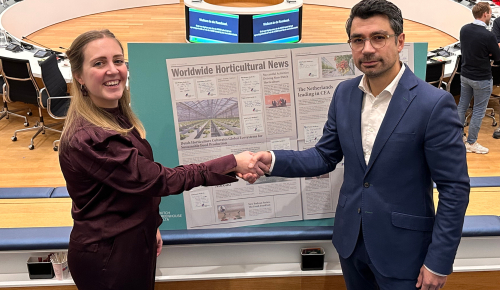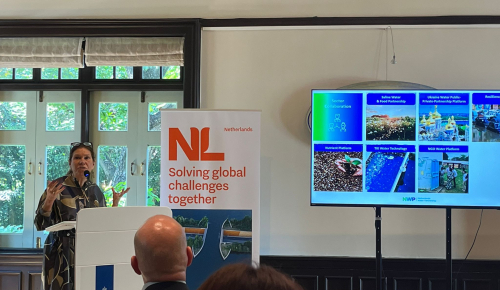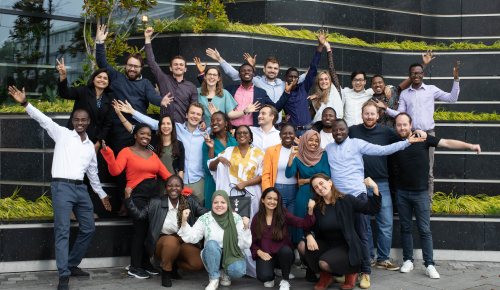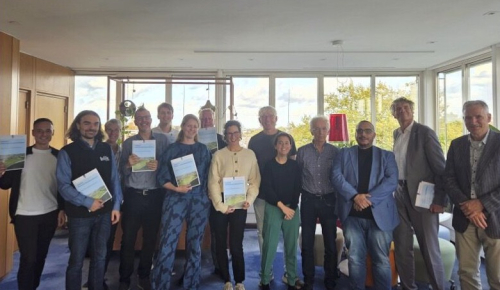News
26 August 2025Tunisian-Dutch knowledge exchange: advancing urban and coastal resilience together
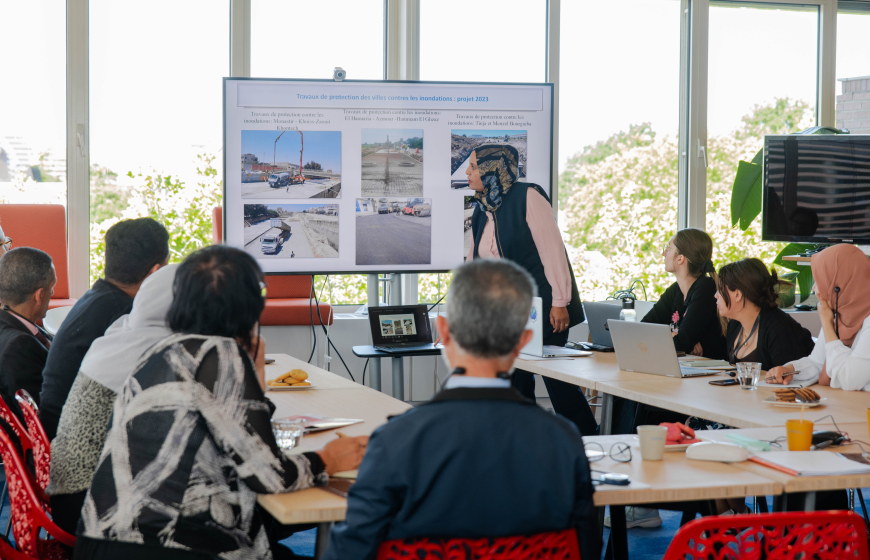

In June, the Netherlands Water Partnership (NWP), in close cooperation with The World Bank and the City Resilience Program, proudly hosted a knowledge exchange week on urban and coastal resilience. The Dutch- Tunisian Knowledge Exchange on Urban and Coastal Resilience Week (15-20 June 2025) brought together a high-level delegation from Tunisia and water experts from the Netherlands for a dynamic, multi-day training week. The week aimed to foster mutual learning, strengthen international collaboration, and explore tangible pathways to enhance climate resilience in vulnerable urban and coastal regions.
Sharing knowledge, strengthening resilience
The Tunisian delegation, comprising senior officials from the Directorate of Urban Hydraulics (DHU) of the Ministry of Equipment and Housing, the Ministry of Finance, and the Ministry of Environment, took part in an intensive programme that combined field visits, expert sessions, and interactive workshops. The delegation and their peers in the Netherlands connected on the topics of urban flood resilience and adaptive coastal protection.
From the iconic water management infrastructure in Katwijk and innovative urban flood solutions in Rotterdam, to coastal interventions in The Hague, the guests from Tunisia experienced firsthand the breadth of Dutch water expertise. The itinerary featured insightful sessions and masterclasses led by experts from both countries, fostering knowledge exchange and collaboration.
This week-long programme was organised by NWP in partnership with the World Bank Tunisia team and the City Resilience Program which falls under the Global Facility for Disaster Reduction and Recovery. The tour supported the World Bank Integrated Disaster Risk Management Programme (Programme Intégré de Gestion des Risques de Catastrophes, or ResCat), and was co-financed by the World Bank and the Agence Française de Développement. The total amount invested through the ResCat programme to bolster Tunisia’s climate resilience is USD 100 million.
This content can not be displayed.
Accept the marketing cookies to view this content.
Programme highlights: a week of insights and exchanges
Governance and resilient coastal protection in The Hague
The week began with an opening session and a governance-focused discussion hosted by the Dutch Ministry of Foreign Affairs. It was attended by both Dutch and Tunisian Ambassadors, and representatives from the municipality of The Hague and the Association of Dutch Municipalities (VNG).
The session laid the groundwork for a meaningful exchange, and was followed by a masterclass on resilient coastal adaptation. The masterclass was held near the prominent Scheveningen multifunctional coastal protection boulevard project, and was attended by staff of the Province of South Holland, OKRA, IHE Delft, and VNG. It showcased the integrated, participatory, and nature-inclusive approach of the Netherlands in managing coastal protection.
Flood protection, heat stress management, tidal park systems, and storms
The second day featured a masterclass on adaptive urban resilience that included high capacity flood protection, heat stress management, tidal park systems, resilient and adaptive reuse projects, floating developments as means of adaptation, and stormwater management. The sessions included masterclasses, talks with local urbanists and walking tours of project sites in Rotterdam. These sessions explored how high-density Dutch urban centres adapt to increasing water challenges while enhancing liveability. The Dutch partners in these sessions included the Global Center for Adaptation, Cityförster, and Defacto Urbanism.
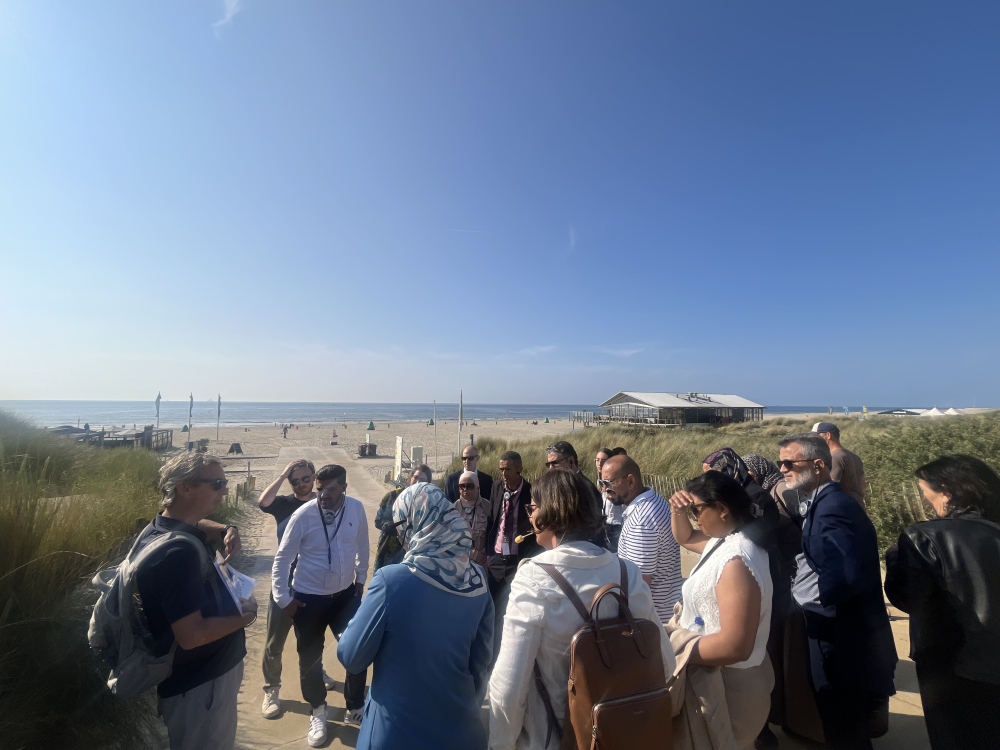
Living with water
On the third day, after a morning masterclass reflecting on the contrast in adaptation between new and old cities such as Almere and Amsterdam at PosadMaxwan, the delegation headed to Amsterdam. They visited the Museum of the Canals to better understand the historical origins of the city’s approach to living with the water.
This was followed by a boat tour on the Amsterdam canals, during which working groups engaged and further reflected with two Dutch urbanists specialised in nature-based solutions in city adaptation. This was complemented by a walking tour to adaptive water resilience project sites in north Amsterdam, guided by One Architecture.
Nature-based solutions and coastal landscaping
The fourth day began at the Deltares research institute in Delft with a masterclass on the role of flood technologies and the knowledge sector in shaping flood resilience solutions in the Netherlands. The delegates toured the facilities at Deltares, visiting several physical hydraulic modelling sites including the impressive Delta Flume, one of the largest of its kind in the world.
After leaving Deltares, the group attended a useful demonstration at Flood Proof Holland by VP Delta. Various emergency flood protection and coastal monitoring technologies by Obscape, Dutch Water Prevention and others are tested at the demo site. At the end of the morning, the delegation visited the Katwijk coastal dunes site to see the innovative hybrid coastal defence systems in which nature-based solutions are used for a multifunctional resilient coastal landscape. The afternoon was concluded with a masterclass on engineering and planning for these types of coastal protection systems. The Dutch partners in these sessions included Haskoning, Witteveen+Bos, and OKRA.
Implementation and the way forward
The week ended at the NWP offices with a practice-oriented project clinic. The delegation members explored the next steps in group sessions. This was supported by a graphic facilitator who visualised how the knowledge exchanged during the week inspired potential future urban and coastal resilient project strategies in Tunisia.
The delegation members presented their project ideas, reflected on key insights gained during the week through shared exchanges with Dutch experts, and reflected on opportunities for adapting principles seen in the Netherlands to their local situations in Tunisia. The programme closed with plenary presentations by each working group, rounding off a rich and collaborative week. Partners from the Netherlands that joined the discussions included Altamira, Cityförster, VNG and Haskoning.
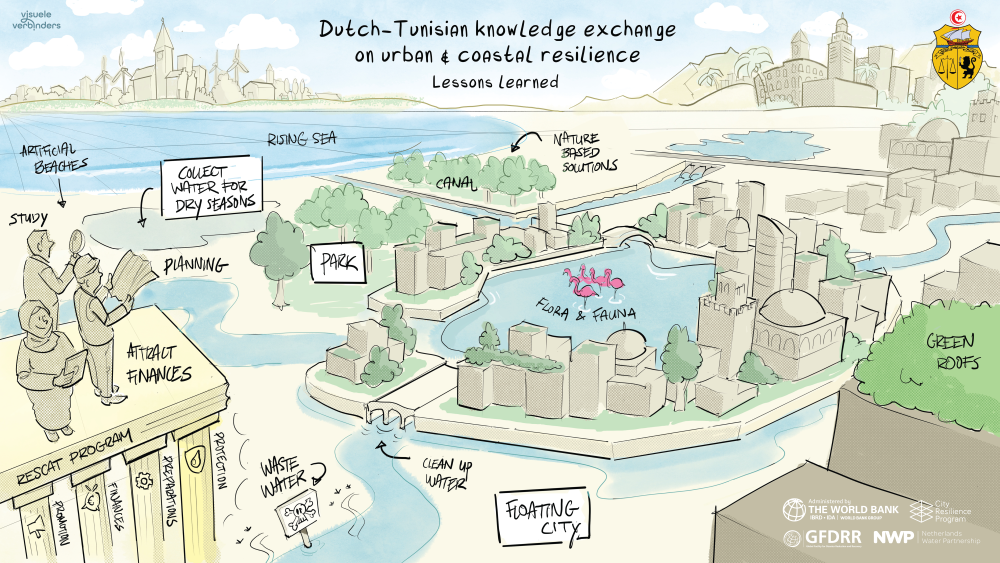
Learning flowed both ways
While the programme was anchored in showcasing Dutch approaches to urban and coastal climate adaptation strategies to build city resilience, it was equally enriched by the knowledge and expertise shared by the Tunisian participants.
The delegation offered valuable information on Tunisia’s on-the-ground efforts to implement flood protection strategies and the integration of nature-based solutions and green infrastructure across their active projects throughout the country. They also reflected on the importance of fostering effective collaboration across government institutions to strengthen flood protection and safeguard vulnerable communities.
Building for the future
Key outcomes of the week-long exchange included:
- increased understanding and first-hand knowledge exchange of the range of implementable solutions tailored to increasing complex and climate-vulnerable areas;
- strengthened bilateral ties between Dutch and Tunisian stakeholders in the field of urban and coastal adaptive city resilience;
- a deepened understanding of the integration of nature-based solutions and green infrastructure in flood risk management; and,
- a wider comprehension of the governance, participatory, and financial backstories accompanying flagship climate adaptation projects in the Netherlands.
NWP valued the fruitful exchange, as well as the Tunisian delegation’s enthusiasm, openness, and insightful contributions. We are also very appreciative of the partnership with The World Bank in conceiving and executing the programme during the delegation’s visit. We also thank the various Dutch water sector organisations who contributed to the visit.
Connecting the Dutch water sector to global challenges and opportunities
By bringing together international partners, facilitating practical peer learning, and promoting integrated approaches to resilience, this knowledge exchange week is a testament to NWP’s commitment to connecting the Dutch water sector to global challenges and opportunities. We look forward to building on this strong foundation and supporting further action toward resilient, inclusive, and sustainable futures in Tunisia and beyond.
Featured NWP partners: The World Bank
